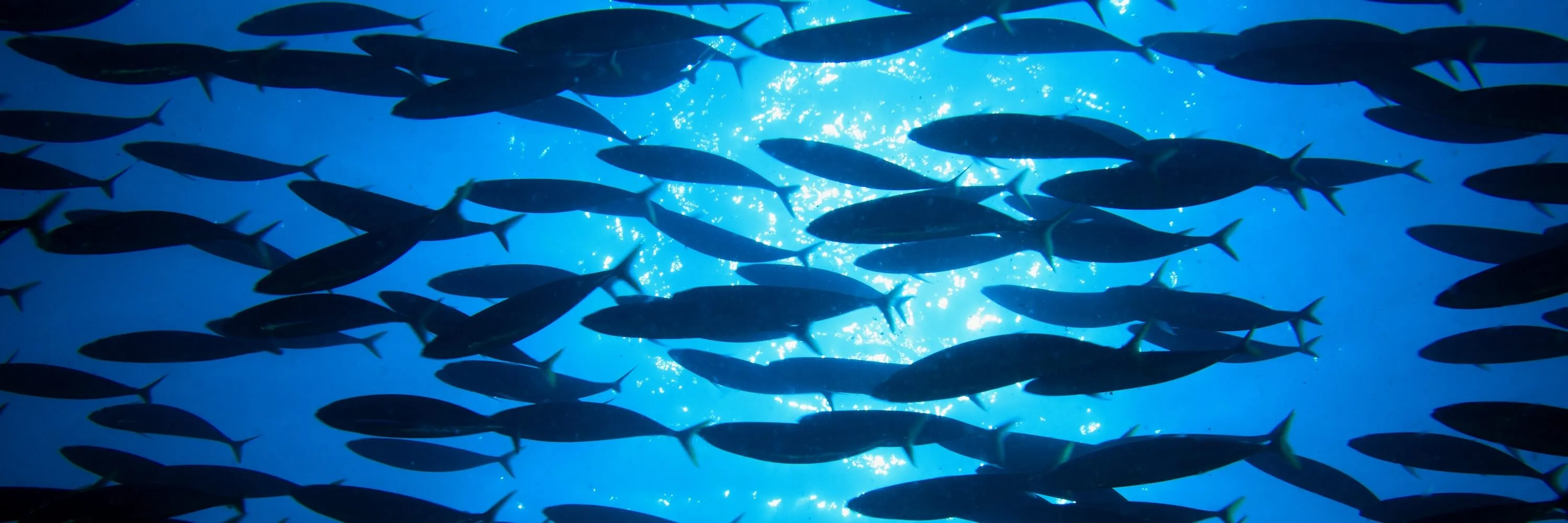STOP THE FRENCH ACCREDITATION SCHEME ‘LABEL ROUGE’ FROM SELLING CRUEL SCOTTISH SALMON
Sign to urge the INAO to immediately review and recommend the withdrawal of Label Rouge accreditation from Scottish farmed salmon.
Label Rouge: propping up cruelty behind a ‘superior quality’ label
The Scottish salmon farming industry is in crisis. Each year, around 52 million salmon are farmed in the UK, primarily in Scotland, but poor conditions – including crowded cages, disease outbreaks and lice infestations – lead to the deaths of around one in four of these fish on Scottish farms before they even reach the desired slaughter weight.
With a lack of species-specific laws protecting salmon at the time of killing, many who make it to the slaughterhouse are at risk of extreme pain in their final moments. Our investigations have exposed fish being punched, thrown, left to suffocate, having their gills cut while still conscious, and enduring severe deformities, illness, and open wounds from parasitic sea lice eating their flesh. We have also revealed workers urinating beside the sea pens, adding to the cocktail of fish waste and filth already contaminating the underwater cages.
France is a major importer of Scottish salmon, and around one-third of it carries the French Government-backed Label Rouge mark. Label Rouge is one of France’s most trusted quality labels, a symbol built on decades of public confidence. But continuing to accredit Scottish salmon from intensive farms – despite clear evidence of poor welfare and environmental harm – puts that trust at risk.
Label Rouge markets itself as a premium brand, but alarmingly, standards are already slipping and do not meaningfully differ from some more ‘conventional’ lower welfare conditions. By endorsing these ‘products’, Label Rouge risks not only misleading consumers but they’re also propping up an industry marked by widespread animal suffering and environmental damage.
A Fidra survey discovered that 94% of UK citizens are unaware that all Scottish salmon sold in supermarkets is farmed. Similarly, consumer polling commissioned by Animal Equality discovered that 97% of French consumers are also confused about the origins of Scottish salmon.
We must end this misinformation crisis and stop animals from suffering.
We’re urging the French National Institute of Origin and Quality (INAO) to recommend that Scottish farmed salmon be dropped from the Label Rouge certification scheme. Sign our petition now to add your voice.
SCOTTISH SALMON Statistics
The cruel reality of the Scottish salmon industry
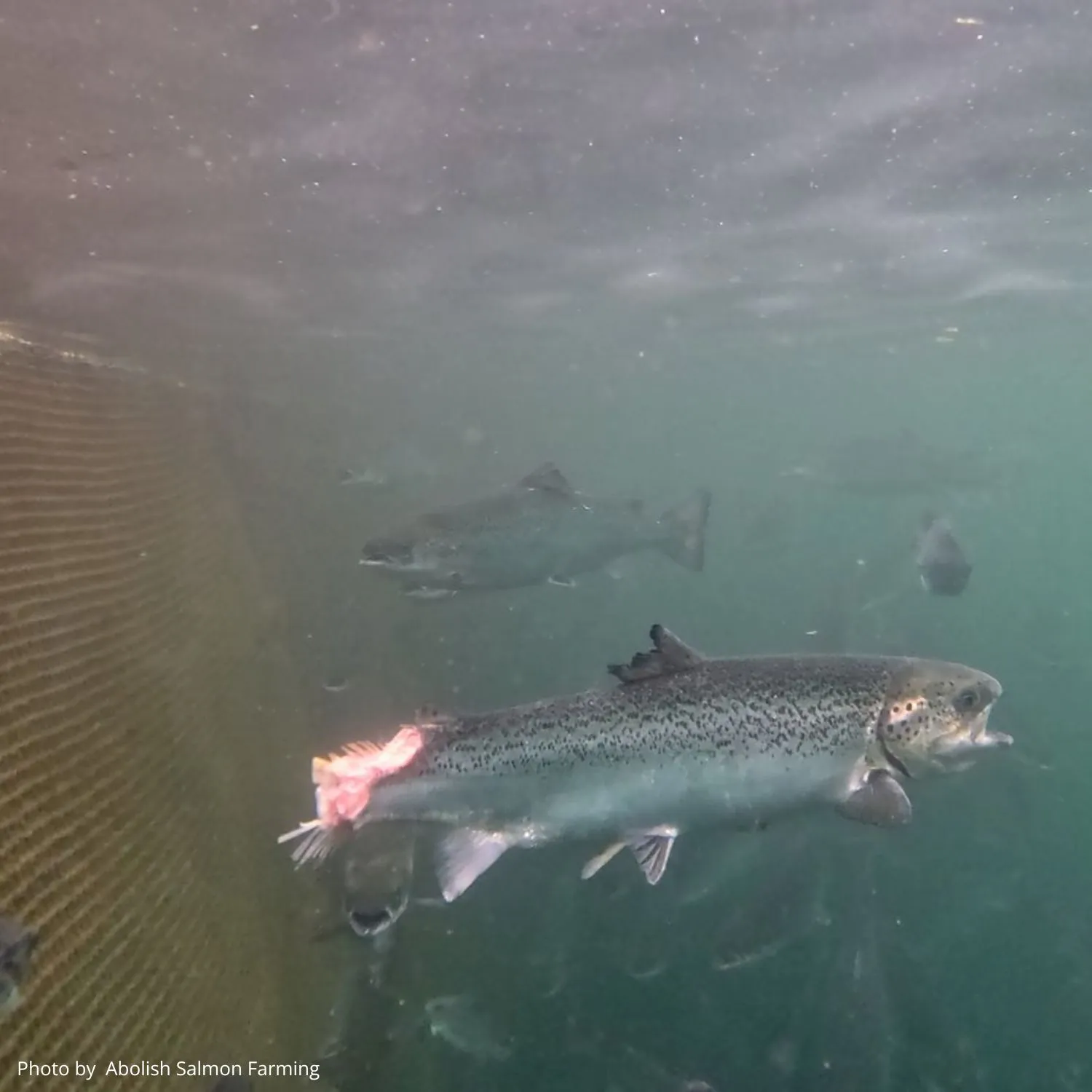
Life for fish on Scottish salmon farms is miserable, with around one in four dying before reaching the industry’s desired slaughter weight. Crowded cages confining up to tens of thousands of fish are breeding grounds for disease and parasitic lice infestations, leaving salmon blind, missing eyes, or with large patches of flesh eaten away – we have even discovered some salmon with seaweed growing from their open wounds.
In a desperate attempt to control the lice, toxic chemicals like hydrogen peroxide and formaldehyde are used alongside abrasive non-medicinal delousing treatments such as hydrolicers, causing further suffering. For those that survive these conditions and reach the slaughterhouse, their suffering often continues until the very end.
Due to weak legal protections and poor enforcement, Animal Equality has exposed fish in abattoirs and slaughter boats being punched, suffocated, thrown, having their gills cut while conscious, and suffering from severe deformities and illness.
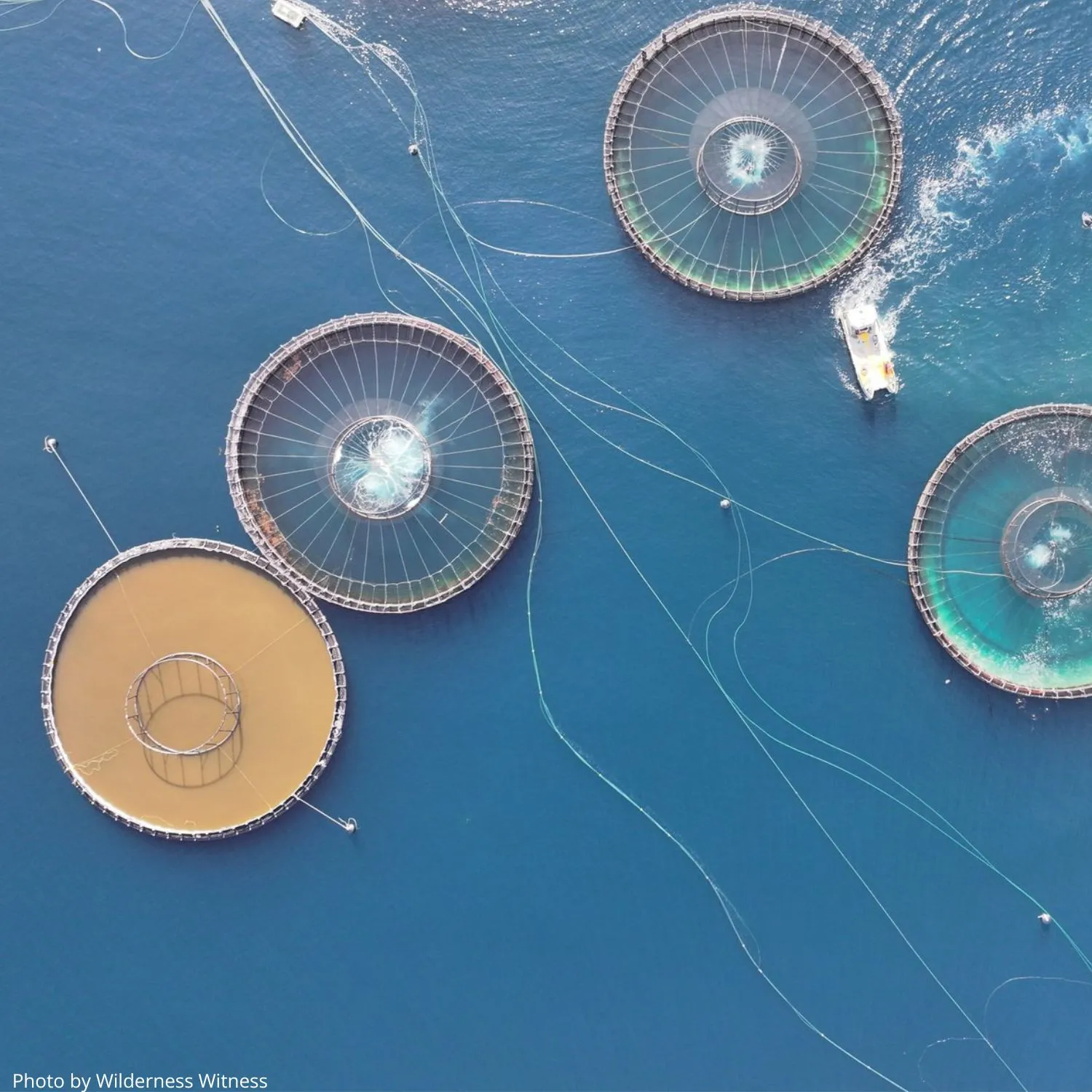
The industry pollutes surrounding waters with harmful substances. Investigative news publication, The Ferret, reported that over a five year period, salmon farms run by eight companies in Scotland discharged over 40 million litres of toxic hydrogen peroxide, endangering marine species like lobsters, shrimp, and krill. Chemical pollution is compounded by incidents such as the Julie Anne oil spill from a farm workboat, which went largely unpunished – further harming aquatic ecosystems and exposing weak regulatory oversight.
Escapes of farmed salmon have also become a serious problem. Hundreds of thousands of farmed salmon have escaped fish farms in Scotland over recent years, spreading diseases and parasites, and interbreeding with wild salmon and trout. These escapes threaten the genetic health and survival of native wild fish populations.
Despite the soaring death rates and environmentally destructive practices, Scotland’s penalty system remains lax. The industry would have faced millions of pounds in fines if these incidents had occurred abroad.
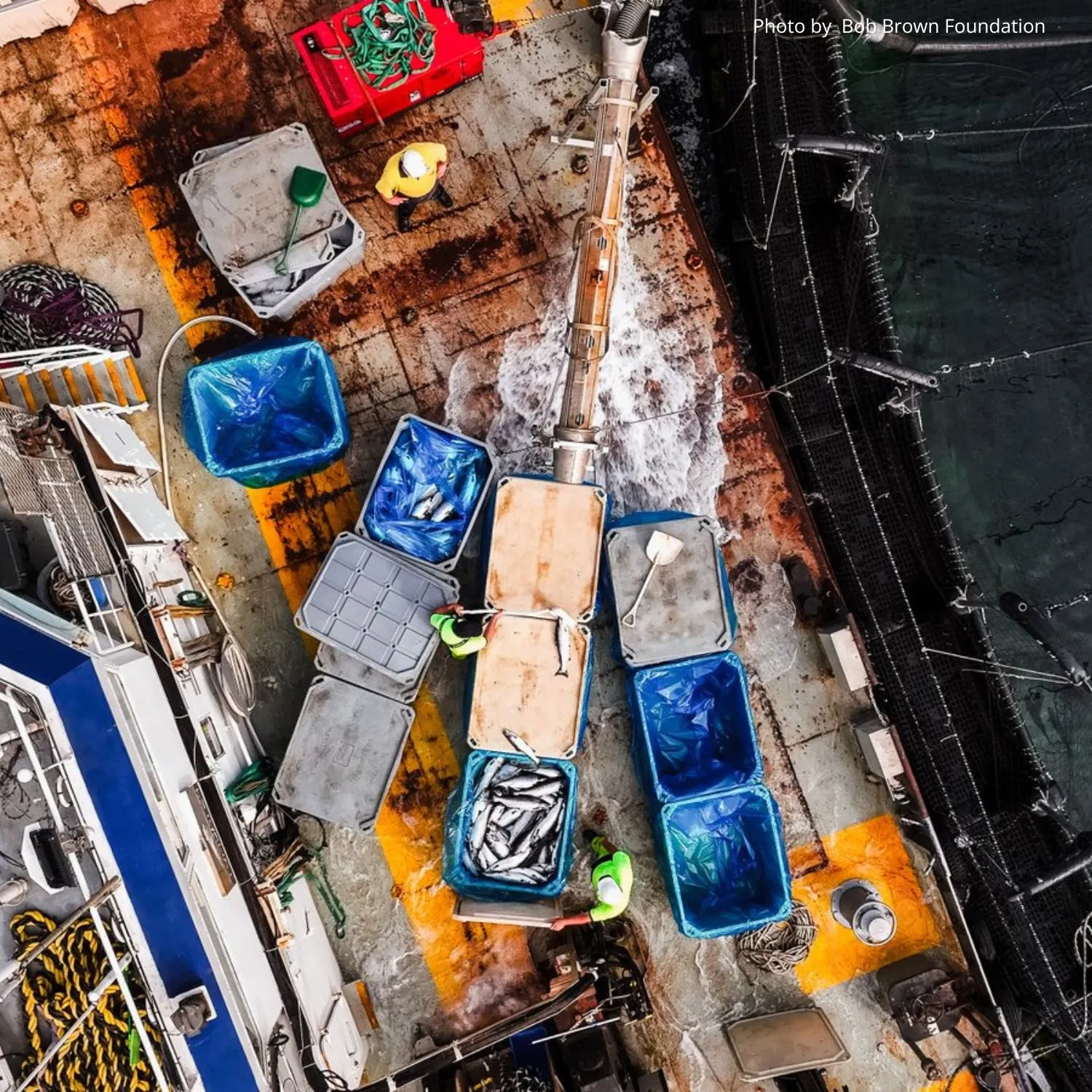
Due to their unnatural living conditions and regulated diets, farmed salmon are not naturally pink; without artificial intervention, their flesh would be a pale off-white. Instead, Scottish salmon companies add pigments like astaxanthin to the fish feed.
PROGRESS SO FAR
Multiple exposés and media coverage
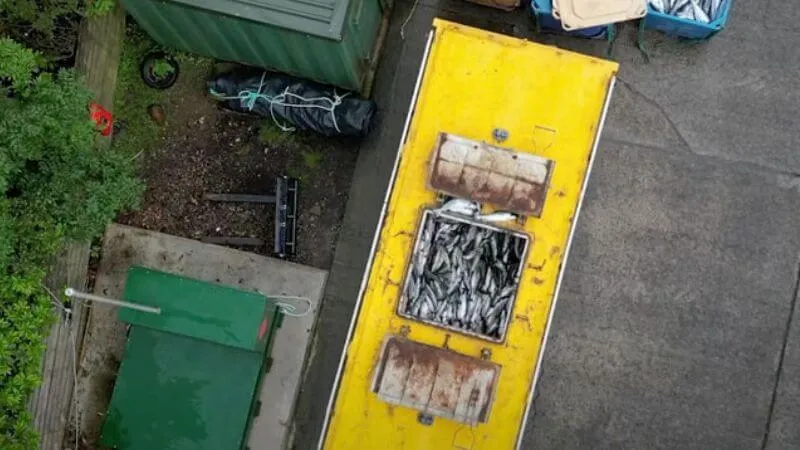
Animal Equality has exposed multiple Scottish salmon farms and slaughterhouses over the years, documenting severe animal suffering and environmental destruction. Our footage has received widespread coverage in major media outlets, including BBC Countryfile, The Observer, The Times, The Guardian, The Independent, The Scotsman, and Scotland’s most widely read newspaper, The Daily Record.
Our footage has sparked fiery debates in Scottish Parliament, including a one-hour discussion as part of a formal Holyrood inquiry, with one Member of Scottish Parliament admitting that “the industry’s days are numbered”.
Legal challenges and planning precedents
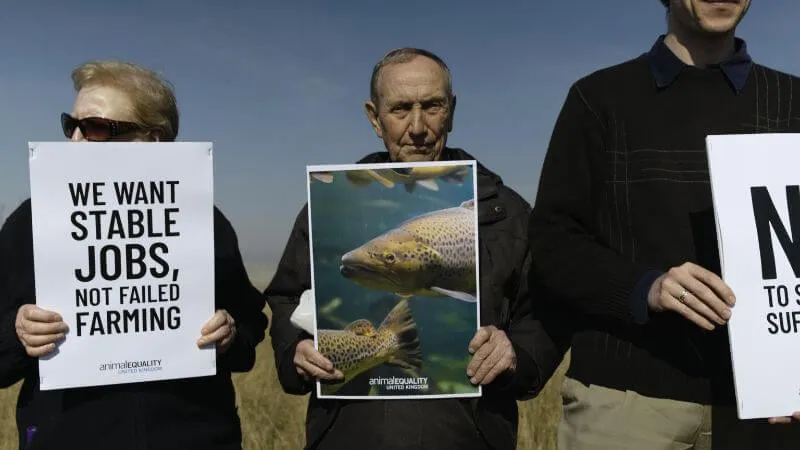
As waters warm and more fish die, the industry is making moves to on-land salmon farms, but Animal Equality’s team is fighting them every step of the way. We took North East Lincolnshire Council to the High Court after it approved the UK’s first onshore mega salmon farm and delayed its construction by two years – saving millions of lives in the process.
Transparency and labelling campaigns
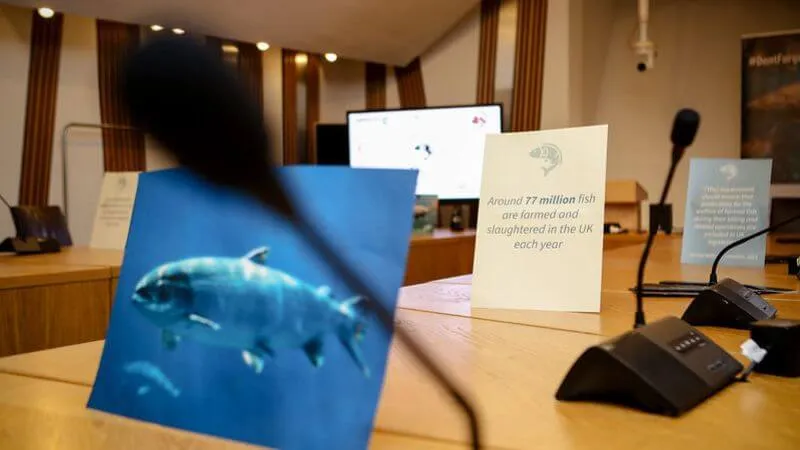
Transparency remains a key focus. Following industry lobbying, the UK Government removed the word ‘farmed’ from the Scottish salmon Protected Geographical Indication (PGI) – mainly used for salmon exports. This outrageous decision means consumers have even less information at their fingertips than before. Animal Equality warned this change could further mislead consumers and we are currently challenging the UK Government in court in an attempt to reverse this reckless decision.
While we challenge misinformation at home, we must also do the same abroad. That’s why we are actively calling on the French quality certification scheme, Label Rouge, to drop its endorsement of Scottish salmon. This move aims to protect consumer trust by ensuring shoppers are not misled about the true nature of the products they’re buying.
There is a striking knowledge gap among consumers. Animal Equality’s French consumer survey shows that 97% of French adults who regularly purchase Scottish salmon certified by Label Rouge are unaware the fish are intensively farmed.
TAKE ACTION FOR FISH!
Millions of salmon endure suffering every year under the banner of ‘quality’ – but what they experience is anything but. It’s big business and big cruelty.
Sign our petition to urge the French National Institute of Origin and Quality (INAO) to recommend that Scottish farmed salmon be dropped from the Label Rouge certification scheme. This simple action could help spare millions of fish from suffering.
And remember, there is no compassionate way to farm fish. These are migratory animals who deserve to explore the ocean – not to be trapped inside underwater cages or artificial tanks. Save them from a life of suffering and a traumatic death by choosing plant-based alternatives today.
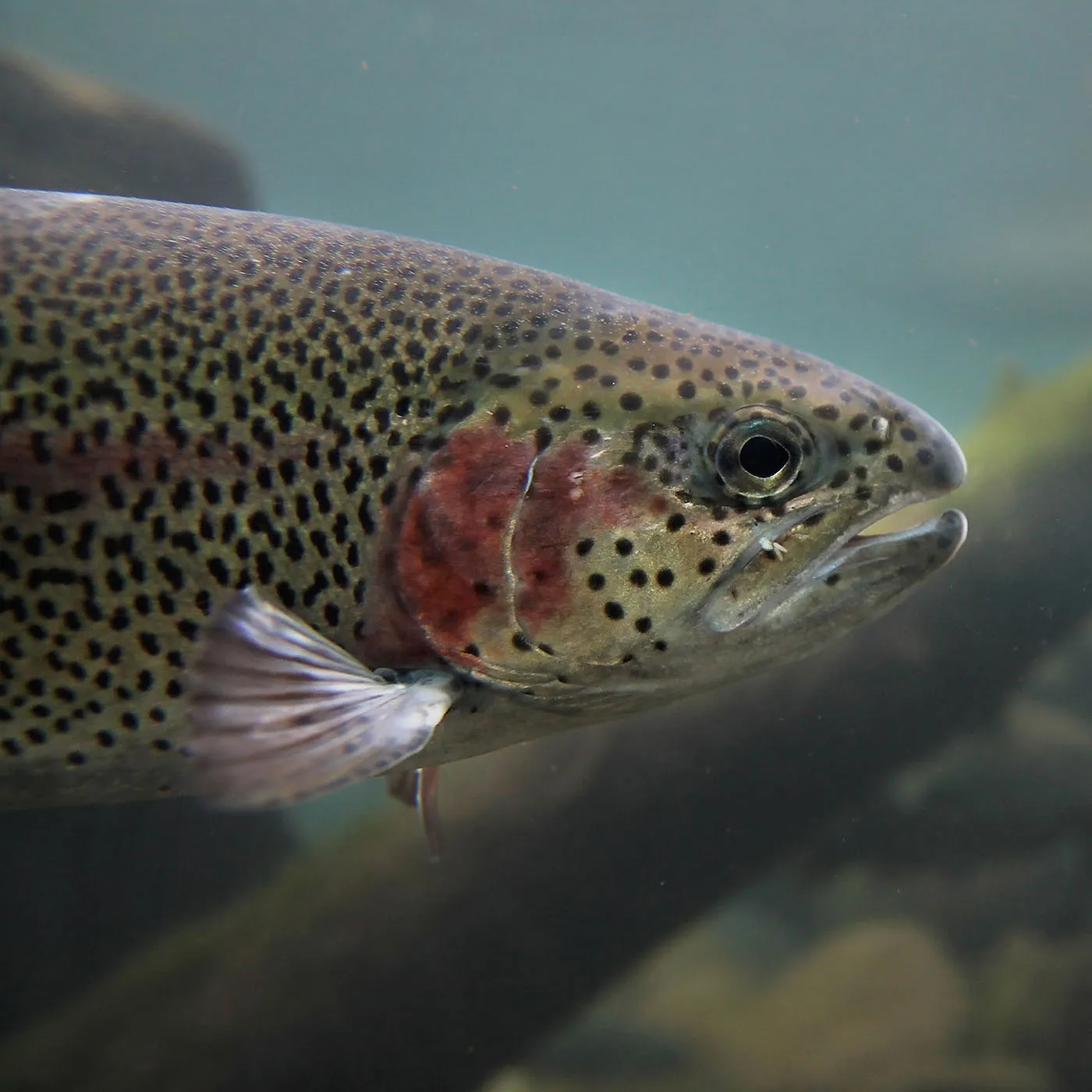
Protect Fish
Scientists confirm that fish feel pain and suffer. Protect these sensitive beings by choosing plant-based alternatives to animal food products.


